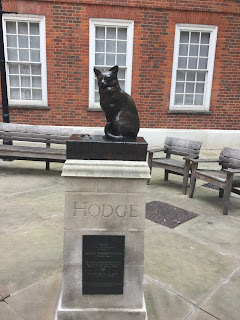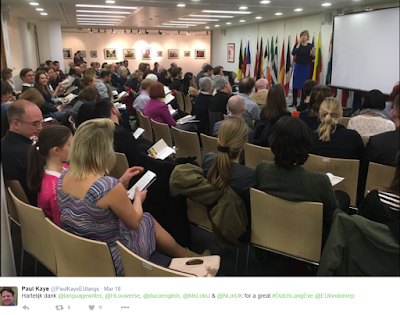 |
| Is the British linguist as endangered as the red squirrel? |
The corporate language in many companies today is often
English. Rumours are circulating that even the European Union is considering
using English as its sole working language. Clients expect translators only to
work into their mother tongue. The European translation standard EN15038 recognises
this. It seems that our largely monolingual British politicians consider the supremacy of English an
advantage. As a linguist, I recognise how important language training is to
understanding other cultures and broadening the mind.
Languages in the
business world
I read recently that the Kristalina Georgieva,
the Bulgarian Vice-President for Budget and Human Resources at the European Commission
accepted that she had to speak English for her career. For the British linguist,
the situation is very different.
During my career, there have been many occasions when I
could have handled a meeting in French or German. They all usually took place in English, because at least one of the senior British managers could
only speak English. This situation leads to the erosion of a British linguist's language
skills and confidence.
Contrary to popular belief or published surveys, UK
companies do not appear to value language skills as highly as they claim. They
generally prefer to employ other nationalities. Nordic countries, Germans,
the Swiss and the Dutch generally speak English extremely well. However, they can
rarely write it as well, or fully appreciate nuances and idioms.
Promote the British
linguist
I believe that the UK language-related institutes should
promote the cause of the British linguist. This is not to suggest that they
should neglect the interests of members with other nationalities. You can
hardly expect the German BDÜ to promote linguists' education and language professions
in the UK, can you?
 |
| Promoting the British linguist © UMB-O |
"Non-native"
translation
When I was a Council Member at the Chartered Institute of
Linguists, an article appeared in The
Linguist presenting a German translator's case for translating into
English. At the time, I wanted to write a letter to the editor. Having written
my MSc dissertation on EN15038, I felt quite strongly about the issue. However,
I respected that it was not considered appropriate for a Council member to
criticise the editorial policy in print at that time.
Cultural
understanding
Most politicians in our country are monoglots. They are
accustomed to conducting business abroad in English. Many seem to feel that it
is an advantage to speak English. As a linguist, I appreciate how much cultural
understanding is missed or lost. I was studying in France in the 1980s when
Margaret Thatcher was arguing with the EU over a budget rebate. The French very
much respect and enjoy a good debate. However, I remember how every time I went
into my bank, they were always baffled by our Prime Minister's manner and
approach.
Is English an
advantage or a disadvantage?
Misunderstandings can easily arise if if a foreign national has to present their case in English. The discomfort can even lead to a build-up of resentment. It is difficult to express everything as clearly and in as much detail as you might like. On the other hand, it is also said that
it is easier to keep your calm and emotional distance in a foreign language.
I always prefer to listen to someone speaking in his or her
native tongue. I find that it is far easier to assess their
personality, intellect and intentions. I also believe that speaking other languages has
made me more receptive to other cultures and more open-minded.
MPs
I was appalled to read about Caroline Lucas' experiences as an MP in the Press recently. It is hardly surprising that there are so few
female MPs. It must be very hard to have to vote with the party line against
your conscience. And why would you not choose the best person possible for a
committee based on their skills?
Open data?
As we all know, the British linguist has had a very
difficult time. It is sad that the review of the MoJ Framework agreement has
been delayed until after the elections. I attended a UKTI Smart City event for
SMEs in March at City Hall, London. I understand that the speakers were unable
to reveal some Smart City information until after the elections there too. I
can't help wondering how much other information is being delayed. Is this
democratic? How can voters decide properly if all information is not shared
with them? Is this approach in keeping with the new era of open data?
Public v. Private
Sector
Of course, unlike many of my former fellow Council members, I
have spent almost my entire career in the private sector. I have only ever
worked in the public sector temporarily. I have never had to sign the
Official Secrets Act. I suppose my views may be construed as ignorance or
naïvety on how the public sector functions.
MoJ Framework
Agreement
I remember writing to my MP, Sir John Randall about the MoJ
Framework agreement. At the time, I was writing an article for Multilingual
Magazine. Until recently, John Randall was the MP for Uxbridge and South
Ruislip. He was Deputy Chief Whip between 2010 and 2013. He famously resigned
as the Opposition Whip over the Iraq War. I thought that he might be
particularly interested in the MoJ Framework Agreement. After all, he is a
linguist who studied Serbo-Croat at university. I was disappointed that he
didn't attend a debate after I had raised the issue with him. I know he was very
concerned about modern-day slavery in the area. (As a safe Conservative seat, our new MP is
expected to be London's Mayor, Boris Johnson).
Ethnic identity
I should like to make it clear that when I refer to
non-native English, I am not referring to ethnicity. My own children are mixed
race on their father's side - a mixture of Indian, Portuguese, Irish and Welsh.
I increasingly detest ethnic monitoring forms. What is "white
British"? Should one brother tick a different box because of a slightly darker
skin tone? I am glad that as teenagers, my sons can now decide on their own
ethnic identity. They both consider themselves British. They support England in
the football, cricket, etc; Lewis Hamilton in the F1. Unfortunately, they don't
speak Tamil, Hindi, Portuguese, Gaelic or Welsh. The National Curriculum even
put them off Spanish.
Identity over 3
generations
I remember attending an event at European Commission Representation in the UK during the
Cypriot Presidency of the EU. Writers of Greek and Turkish Cypriot origin
discussed their work together. One of the writers described a similar situation
to that of my children. She was in the third generation of her family in the
UK. She mentioned how the first generation (her grandparents) had found the
adjustment after immigration difficult. Her parents in the second generation
had more of an identity crisis between the two cultures. She considered herself
British. She supported England in the football, although some of the extended
members of her family disapproved.
A' level language
range
I feel that dropping rarer languages from the A' level
syllabus is short-sighted. Yes, it is important that immigrants speak and write
English. However, it is also important to retain and pass on a sense of cultural
identity and history. The latest issue of The
Linguist has an excellent article on Saturday schools for children.
Polish in West London
In West London, Polish is the second most commonly spoken
language. I believe that it would be an enormous loss to Britain if immigrants were to
entirely lose their Polish. Without a formal education in Polish, children
would not be able to speak or write their grandparents' mother tongue
accurately. Trade with Poland could be greatly facilitated if Britain actively
promotes cultural understanding and the Polish language in the younger
generation.
Ruislip has a very long association with Poles. I hear
Polish nearly every day. My home is near the Polish War Memorial. Polish airmen
were based here at RAF Northolt. They fought with the British in World War II.
Many had to settle here after the war. They are very much part of the local
community. Now new generations are following them.
 |
| Polish War Memorial, Ruislip CC BY-SA 3.0 |
Cultural diversity
Britain today has an extraordinarily diverse population.
Mass immigration is placing a strain on infrastructure, but this diversity
could also be turned to great economic advantage. Britain has the opportunity
to become much more attuned to other cultures and languages. Perhaps it is not
viable for all languages to have their own A' level. Could the Chartered
Institute of Linguists or another body create suitable professional
examinations in rarer languages?
 |
| Grey squirrel © robert cicchetti |
The British population is already very culturally diverse. We're
not endangered red squirrels, we've been grey squirrels for centuries already.
The best place to see how to handle cultural diversity is in primary school
playgrounds. British linguists do not have to be an endangered species. We
could have a whole new generation of bilinguals, if only we realise and
promote the opportunities.
If you would appreciate help with your technical marketing communications, email karen@anglicity.com
Karen Andrews runs
Anglicity Ltd. She is a
technical writer and
translator with over
15 years' global marketing
experience. Anglicity offers
marketing consultancy with a
focus on innovation
and the environment.
Find me on Twitter @AnglicityKaren
 What else is different? I really appreciated the explanations alongside each set of lanterns. They gave an insight into Chinese culture. Some of the symbols might otherwise have passed me by. For example, I learnt that the clouds in a lantern group of peonies, roses and magpies symbolise good luck and fortune. Butterfiles symbolise good fortune and best wishes.
What else is different? I really appreciated the explanations alongside each set of lanterns. They gave an insight into Chinese culture. Some of the symbols might otherwise have passed me by. For example, I learnt that the clouds in a lantern group of peonies, roses and magpies symbolise good luck and fortune. Butterfiles symbolise good fortune and best wishes. 
 It was delightful to recognise some of the characters from the Chinese opera, The Peony Pavilion (below left).
It was delightful to recognise some of the characters from the Chinese opera, The Peony Pavilion (below left). 




















